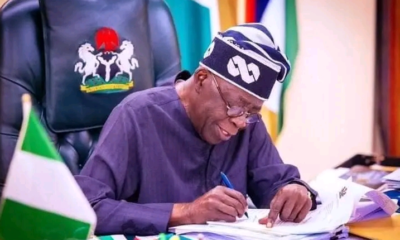News
European Union (EU) Set Flagship Program Rolling To End Violence Against Women Worldwide


The €500 million Spotlight Initiative has been an ambitious attempt by the European Commission, together with the UN, to ensure that women and girls around the world live free from violence and harmful practices.
However, according to a new report by the European Court of Auditors, this flagship EU program for combating sexual and gender-based violence has shown little impact to date in terms of improving the situation of those it is intended to help.
Despite positive achievements, the auditors found that the initiative could be managed more efficiently and could provide better value for money, as well as increase the share of funding that reaches final beneficiaries to help more women and girls.
The Spotlight Initiative is a global strategic partnership between the EU and the UN to eliminate all forms of violence against women and girls in partner countries in Africa, Asia, Latin America, the Pacific, and the Caribbean. Initially launched in 2017 for a period of four years, it was extended to the end of 2023 due to delays.
“Violence against women and girls has no place in the world, and no woman or girl should be left behind,” said Bettina Jakobsen, the ECA member in charge of the report.
“Through the Spotlight Initiative, the EU has put more money than ever into ending such abuse, but more should reach final beneficiaries and we still need to see more impact.”
The auditors acknowledge that the initiative has benefited women and girls globally and helped to address violence.
For instance, it has supported activities to prevent violence against women and girls, such as training and awareness campaigns, and services to victims of violence in all African and Latin American countries, albeit to different degrees and with varying levels of success.
However, the initiative’s setup only allows for a limited assessment of performance. Moreover, given its short time span and the fact that data are incomplete, it has not yet been possible to measure the improvement for beneficiaries, such as victims of violence or participants in training courses, and it is difficult to assess the extent to which it has achieved its intended results.
There is no evidence that violence against women and girls has fallen in the countries covered.
External and internal factors led to challenges and delays in implementation. These included not only the COVID-19 pandemic, natural disasters, and domestic political changes, but also complex governance arrangements due to the number of UN organizations involved.
The Commission’s choice of the UN as its implementing partner was a political decision in support of multilateralism. However, the UN’s costs of administering the initiative totaled $155 million (i.e. 31 % of the initiative’s total budget), leaving $351 million for the implementing partners and beneficiaries.
Although the EU’s executive was aware that UN involvement entailed higher costs, it did not thoroughly compare the alternatives.
Despite being the sole funder, the EU has not always been given sufficient credit for funding visibility. Moreover, although the EU’s contribution was intended as seed funding to attract additional investors, no new donors have been found, so results may not be sustained.
The auditors also stress that the program is not long enough to create lasting change on a complex issue that requires long-term actions and additional resources.
News
UN, FG Seek $306 Million To Avert Food Crisis In Adamawa, Borno, Yobe


The federal government and international partners has launched an appeal, seeking a $306 million to fast-track assistance to address the deteriorating food security and nutrition crisis in Borno, Adamawa and Yobe (BAY) states.
Read Also: Entire Ward Executive Members Dump PDP in Abia
The fund aims to reach 2.8 million people with food assistance, nutrition supplies, clean water, healthcare, and protection support between May-September lean season where 4.8 million people, including the vulnerable are estimated to be facing severe food insecurity.
The plan also includes improving access to water, sanitation, and hygiene to combat infectious diseases, especially among the over 2 million internally displaced persons.
Approximately 700,000 children under five were projected to be acutely malnourished in the next six months, including 230,000 at risk of death without timely intervention in the region.
The appeal is also part of the broader 2024 UN-coordinated Humanitarian Response Plan for Nigeria, aiming to address the critical needs of those affected by the crisis.
At the plan’s launch, the National Emergency Management Agency’s director-general, Zubaida Umar, emphasised the importance of mobilising funds to prevent malnutrition-related deaths and health issues.
The UN resident and humanitarian coordinator, Mohamed Malick Fall, announced an $11 million contribution from the Nigeria Humanitarian Fund to initiate the emergency response.
UNICEF’s acting representative in Nigeria, Dr Rownak Khan, highlighted the race against time to deliver lifesaving nutrition to every child in need, with admissions for severe acute malnutrition already surpassing annual estimates.
The FAO’s interim representative in Nigeria, Dominique Koffy Kouacou, called for urgent interventions to support vulnerable populations’ immediate and long-term needs.
The World Food Programme’s country director, David Stevenson, stressed the need for peace and production to address the conflict in the northeast.
The stakeholders said efforts to protect lives must be coupled with strengthening resilience by supporting agricultural livelihoods, which sustain over 80 percent of the vulnerable population.
According to them, this is the fourth operational plan launched by the UN and partners for the BAY states, which underscored the need to tackle the root causes of hunger and malnutrition, including advancing peace-building efforts, enhancing healthcare, supporting food production, improving social services, and mitigating climate change effects.
News
Tinubu Seeks House of Reps’ Approval To Refund N24 BIllion to Nasarawa, Kebbi


President Bola Tinubu has written the House of Representatives, seeking its approval for the federal government to grant (reimburse) N24 billion promissory notes to Kebbi and Nasarawa state governments.
Read Also: Presidency Reacts As ex-Katsina Governor, Ibrahim Shema Defects To Ruling Party, APC
The N15 billion and N9 billion promissory notes for the Kebbi State and the Nasarawa State respectively are for the takeover of the airports’ built by the two states by the federal government.
The president’s request was conveyed in a letter addressed to the Speaker of the House of Representatives, Hon Abbas Tajudeen and read at plenary on Thursday by the deputy speaker, Hon Benjamin Kalu who presided over the sitting.
The letter reads: “Aviation, including airports, safety of aircraft, and carriage of passengers and goods by air” were under the control of the Federal Government as provided in the 1999 Constitution (As amended).
“Establishment of a promissory note programme in favour of the Kebbi and Nasarawa State governments for the reimbursement of the respective costs of the construction of newly built airports in those states that have been taken over by the federal government.
“The House of Representatives is invited to note that at the Executive Council meeting of the Federal Executive Council FEC, which was held on the 23rd day of May 2023, it was approved as follows:
“That a promissory note in the sum of N9,000,542,651,786.11 be issued to the Nasarawa State government as a refund for the take over of the newly constructed Nasarawa Airport.
“That a promissory note in the sum of N15,137,336,95.88 only be issued to Kebbi State government as refund for the takeover of Birnin Kebbi International Airport.
“I urge the House of Representatives to consider and grant concurrent approval for the establishment of the promissory notes programme in favor of the Kebbi and Nasarawa state governments, respectively, as prescribed in paragraph two above.”
In another letter, President Tinubu transmitted the National Anti-doping Bill, 2024 to the House asking to expeditiously pass it ahead of Olympic coming up in July 2024.
“The National Anti-doping Bill, 2024 seeks to create an administrative independent National Ant-doping organization which is a cardinal requirement for Nigeria to achieve compliance with the world anti-doping code and international standard for code compliance with codes by signatories.
“The enactment of this vital legislation will also help Nigeria avoid imposition of signatories consequences including loss of hosting rights and participation at regional, continental and world championships or major athletic events,” the letter reads.
News
NLC Shuts Down IBEDC Premises Over Electricity Tariff Hike


The Nigeria Labour Congress took action on Monday by closing the gates of the Ibadan Electricity Distribution Company (IBEDC) in Ilorin, Kwara State, in a bid to challenge the earlier imposed electricity tariff hike.
Read Also: Court Disbands Cross River Cocoa Allocation Taskforce
Labour union representatives, stationed at the IBEDC offices in Challenge and Baboko market areas in Ilorin from as early as 7 am, secured the premises by locking the gates, denying access to both employees and customers.
Despite some IBEDC workers lingering nearby, many were unable to enter the premises due to the actions of the labour unions.
Comrade Muritala Olayinka, the Chairman of NLC in Kwara state, stated that the shutdown was in compliance with directives from the national Secretariat of the NLC.
Olayinka affirmed that the IBEDC facilities would remain closed until receiving a contrary instruction from the NLC Secretariat in Abuja.
“The Directive from the National Secretariat of NLC said that the picketing is for today but we will get in touch with the leadership of NLC if it will continue”, he said.
Earlier, the labour unions had given the NERC, till May 12 to withdraw the recent hike in electricity tariff or face unprecedented industrial action.
The ultimatum was issued in a joint letter to the Chairman/Chief Executive Officer, CEO, dated May 3, 2024, and copied to the Secretary to the Government of the Federation, SGF, the Ministers of Labour and Power and the electricity distribution companies, DisCos, among others.
-



 Entertainment1 year ago
Entertainment1 year agoThe Story Of A Woman With Unusual Long Backside, Sarah Baartman
-



 Entertainment1 year ago
Entertainment1 year agoTallest Man In Nigeria Afeez Agoro Cries Out To Nigerians For Financial Support After Chronic Arthritis Diagnosis As SFCOBA 94Set Pays Him Visit
-



 Business2 years ago
Business2 years agoNigeria Vs Ghana: Authentic Nigeria Football and Allied Sports Supporters Club Seals Sponsorship Deal with 86Z Football Technology Limited Foots
-



 Education2 years ago
Education2 years agoTokunbo Wahab: An uncommon legal eagle soaring daily to a greater place in history
-



 News8 months ago
News8 months agoPhysical Planning Commissioner, Oluyinka Olumide Assumes Office …Harps On Transparency, Zero Tolerance To Building Collapse
-



 Featured1 year ago
Featured1 year agoBuruj Football Club’s Players Moving To Europe Delights Obesere
-



 Sports11 months ago
Sports11 months agoVictor Osimhen Returns To Roots As Football Superstar Visits Primary School And Inspires Young Talent
-



 Featured2 years ago
Featured2 years agoQatar 2022 World Cup Playoff: Black Stars Hold Eagles To Scoreless Draw In Kumasi













